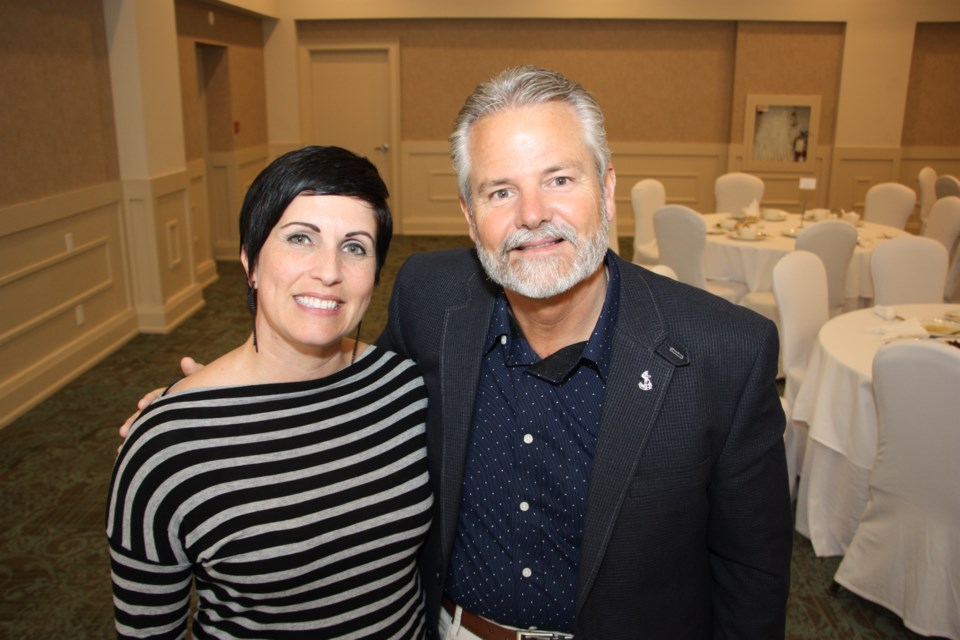If the saying goes “what doesn’t kill you makes you stronger;” Natalie Harris could win a strong woman competition.
“Resiliency is a part of who I am,” said Harris. “It became as necessary as oxygen to me growing up.”
Harris has survived suicide three times. She has post-traumatic stress disorder, depression and anxiety, brought on by the extreme conditions of her work as an advanced care paramedic in Simcoe County.
Though she can’t be on the road anymore, she is still helping to save lives.
“It breaks my heart that I can’t put on my uniform anymore,” said Harris, who was known as a highly competent and caring paramedic.
She was at the Georgian Bay Hotel and Conference Centre on June 14, speaking to a room full of this year’s Health Luncheon attendees. It was the seventh-annual event hosted by the Collingwood General and Marine Hospital. Harris was the guest speaker this year, brought in by the hospital's Community Engagement Committee. The hospital chaplain Greg Armstrong, introduced a new peer support program created to give hospital staff a chance to talk about what they see each day, and the trauma they experience as they care for people in extreme ways.
Harris opened her talk with a video depicting some of the calls she experienced as a paramedic, then narrated a vivid picture of her third suicide attempt in 2014.
“I decided I didn’t want to be alive,” she told the crowd. “There was no remorse, there was no second-guessing it. The pain had turned to peace. It was a release.”
But she survived, and she embarked on a journey from darkness to light.
Harris shared the story of her childhood, growing up with alcoholic parents and caring for her younger brother when her mother suffered an aneurysm.
She said becoming a paramedic was a dream come true.
“I was in my glory,” said Harris. “But no matter how much I loved it, each year became more difficult to handle and I didn’t know why.”
Harris was suffering from cumulative PTSD.
In 2012, she was part of the first responder team called to Barrie Travelodge, where three people lay dead or dying in a blood-soaked room. Eventually, she would learn the events leading up to the scene she encountered. Her patient was Mark Dobson and he was seriously injured. He was also the man convicted of murdering the other two women found in the room. He had cut their throats in a Satanic ritual suicide pact.
In 2014, Harris had to testify at Dobson’s murder trial. Later the same day, she attended a memorial for a fellow paramedic who had taken his own life weeks before.
She overdosed for the second time that night.
“What we do isn’t normal,” said Harris. “Why would it be any surprise to hear first responders die every month because they can’t take it anymore.”
Harris eventually participated in addiction and PTSD programs through Homewood Health and Royal Victoria Regional Health Centre, where she learned she wasn’t alone.
“More than anything, I got humble,” she said.
Harris is now an author and advocates for peer support programs, and that’s what she hopes is the message that emerges from her stories of pain and survival.
“Peer support is essential to keeping our emergency heroes healthy and giving them a long career,” said Harris in an interview with CollingwoodToday.
While she was working as a paramedic, there were no formal peer-support programs in place and there was little talk about the traumatic events first responders and medical workers experience on a regular basis.
“Devil’s advocates will say we signed up for this,” said Harris. “We signed up for the chance to save lives, not for the emotional turmoil … Strength isn’t measured by the number of deaths we pronounce, it’s measured by the number of deaths we need to talk about to be able to sleep at night.”
Talking, according to Harris, is essential and people need to do it more in order to help others headed down the same dark road as Harris travelled.
Harris was encouraged to learn about the peer-support program for Collingwood General and Marine Hospital.
“[The] program is changing our culture and removing mental illness stigma,” said Harris. “When you remove the fear, it gives a person a chance to heal. Stigma keeps us comfortable with the uncomfortable. Stigma locks us up, and makes us stay sick.”
Harris has also started the Wings of Change peer-support program, which has local chapters in Barrie, Midland, Orillia and soon in Wasaga Beach. Wings of Change is open to all community heroes and it is connected to a campaign called I’ve Got Your Back 911.
Though her career on the road contributed to her PTSD and hurt her deeply, she loved her work as an advanced care paramedic.
“I miss it every day,” she said.
For more about Natalie Harris, click here.
